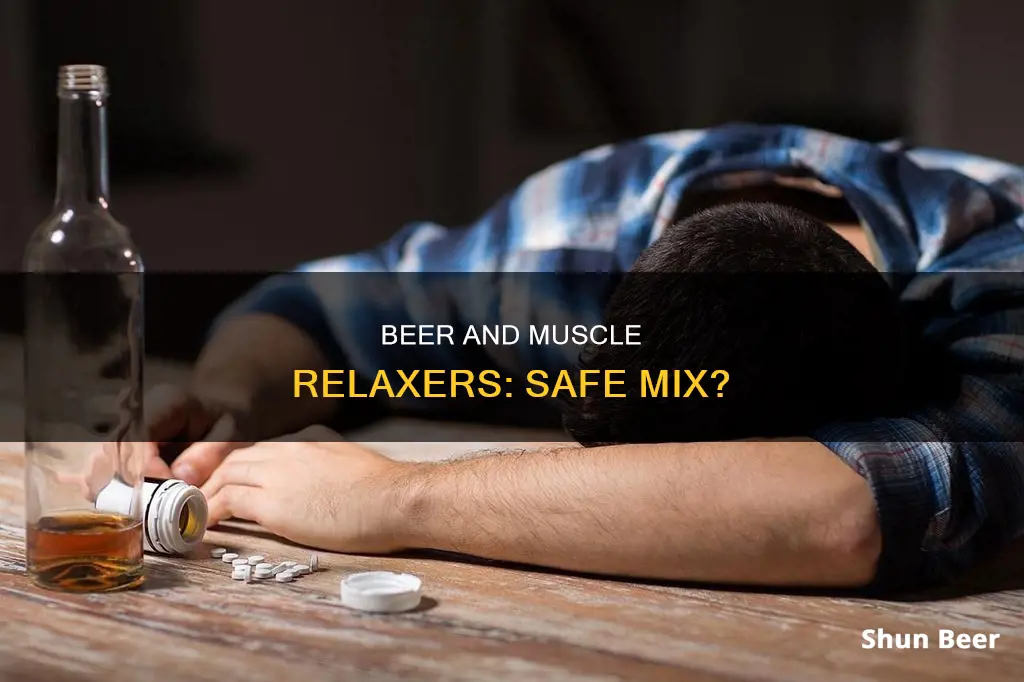
Drinking alcohol while taking muscle relaxers is not advised due to the serious health risks associated with the combination. Both substances are central nervous system depressants, which means they slow down brain activity and functions such as breathing and heart rate. Mixing the two can intensify the side effects of muscle relaxers, leading to dangerous symptoms such as increased drowsiness, dizziness, impaired coordination, memory problems, seizures, and an increased risk of overdose. Additionally, both alcohol and muscle relaxers are potentially addictive, and their combined use can lead to a higher risk of addiction and alcohol poisoning. It is recommended to consult a healthcare professional or follow the prescription instructions to avoid any harmful interactions and potential long-term damage to vital organs.
| Characteristics | Values |
|---|---|
| Should you drink beer when taking muscle relaxers? | No |
| Why? | Both muscle relaxers and alcohol are central nervous system depressants, which slow down brain activity, breathing and heart rate, and can make you feel calm or sleepy. |
| What happens if you mix them? | The effects of muscle relaxers are intensified, leading to increased drowsiness, dizziness, impaired coordination, memory problems, risk of seizures, and risk of overdose. |
| What should you do if you've already mixed them? | Stop drinking immediately and seek medical help if necessary. |
| What are the long-term effects of mixing muscle relaxers and alcohol? | Liver damage, kidney damage, gastrointestinal issues, addiction, and increased risk of alcohol poisoning. |
What You'll Learn

Why you shouldn't mix muscle relaxers and alcohol
Muscle relaxers are a group of drugs that relieve muscle spasms or pain. They are often prescribed to help ease symptoms associated with conditions such as back pain, neck pain, and tension headaches. While these medications can be beneficial for managing pain, it is important to avoid mixing them with alcohol due to the serious risks involved. Here are several reasons why you shouldn't mix muscle relaxers and alcohol:
Intensified Side Effects
Both muscle relaxers and alcohol are central nervous system depressants, which means they slow down brain activity and have sedative effects on the body. When combined, they can intensify each other's side effects, including drowsiness, dizziness, nausea, impaired coordination, and confusion. This heightened impact can lead to dangerous situations, such as falls, car accidents, or other injuries.
Increased Health Risks
Mixing muscle relaxers and alcohol can lead to several short-term and long-term health risks. In the short term, individuals may experience impaired judgment, dangerous mood swings, aggressive behaviours, lethargy, and poor coordination. In the long term, the continuous ingestion of both substances can cause damage to internal organs, such as the liver and kidneys. Mixing these substances also increases the risk of addiction, overdose, and alcohol poisoning.
Difficulty in Breathing
The combination of muscle relaxers and alcohol can have a detrimental effect on respiratory function. Muscle relaxers can slow down breathing, and when combined with alcohol, this effect is amplified, leading to difficulty in breathing or even stopped breathing, which can be life-threatening.
Gastrointestinal Damage
Alcohol is known to cause intestinal damage and inflammation in the lining of the gastrointestinal tract. Prescription medications, including muscle relaxers, can also have negative side effects on the GI tract over time. Mixing alcohol and muscle relaxers can lead to gastrointestinal damage, including issues such as ulcers, hemorrhoids, constipation, or diarrhea.
Increased Risk of Accidents and Injuries
The consumption of alcohol and muscle relaxers can impair cognitive and motor functions, increasing the risk of accidents. This is especially concerning for individuals who operate machinery or drive vehicles. The combination of these substances can also lead to poor vision and confusion, further elevating the chances of accidental injuries.
In conclusion, it is evident that mixing muscle relaxers and alcohol can have severe and potentially fatal consequences. To ensure your safety and well-being, it is crucial to refrain from consuming alcohol while taking muscle relaxers. If you have any doubts or concerns, it is always best to consult with your doctor or pharmacist for personalized advice.
Miscarriage and Alcohol: Is Drinking Beer Safe?
You may want to see also

The side effects of muscle relaxers
Muscle relaxers are central nervous system depressants that slow down the central nervous system. They are prescription medications that help relieve pain caused by muscle spasms and muscle spasticity. While there are many different types of muscle relaxers, they all work in a similar manner, blocking nerve impulses that cause painful muscle contractions.
- Drowsiness and fatigue
- Unsteadiness, dizziness, and clumsiness
- Headache and vision troubles
- Quickened heart rate
- Upset stomach, nausea, and vomiting
- Urinary incontinence
- Psychiatric side effects, such as irritability and agitation
- Drug abuse or dependence
- Gastrointestinal side effects
- Genitourinary side effects, such as urinary tract infections
- Increased ocular pressure
- Increased liver enzymes
- Liver damage
- Kidney damage
- Respiratory depression
- Seizures
- Coma
- Memory problems
- Blurred vision
- Fainting
- Slurred speech
- Poor judgment and decision-making skills
- Motor skill impairment
- Poor memory and concentration
- Dry mouth
- Constipation
- Addiction and withdrawal symptoms
Beer and Aortic Aneurysms: What You Need to Know
You may want to see also

The effects of alcohol
When someone drinks alcohol, it is absorbed into the bloodstream and travels quickly to the brain. Here, alcohol interferes with the neurotransmitters that send messages between cells. This disruption leads to feelings of relaxation and sedation. As more alcohol enters the bloodstream, it begins to affect the body in other ways. Muscle coordination becomes impaired, leading to slurred speech, vomiting and decreased inhibitions.
Alcohol has many side effects, including:
- Abdominal pain
- Nausea and vomiting
- Depression and anxiety
- Confusion and an inability to think clearly
- Dizziness and problems with balance and walking
- Impaired judgement and poor decision-making skills
- Motor skill impairment
- Poor memory and trouble concentrating
Light Beer and Weight Loss: Friend or Foe?
You may want to see also

The short-term effects of mixing muscle relaxers and alcohol
Mixing muscle relaxers and alcohol can have serious short-term effects. Both substances are central nervous system depressants, which means they slow down brain activity and functions such as breathing and heart rate. They can also induce feelings of calmness or sleepiness.
Combining muscle relaxers and alcohol can compound their impact on the body, intensifying the side effects of muscle relaxers, such as drowsiness, dizziness, and impaired coordination. This can lead to an increased risk of falls, motor accidents, and injuries. The mixture can also cause lethargy, confusion, and poor coordination, making it dangerous to operate machinery or drive a car.
The combination of these substances can also lead to an increased risk of seizures, respiratory depression, and overdose. It can impair an individual's ability to think clearly, leading to impaired judgment, dangerous mood swings, and aggressive behaviours.
Mixing muscle relaxers and alcohol can also cause gastrointestinal issues, such as abdominal pain, nausea, and vomiting. It can also worsen chronic pain and negatively impact cognitive function and memory.
Yeast Infection and Beer: A Dangerous Combination?
You may want to see also

The long-term effects of mixing muscle relaxers and alcohol
Mixing muscle relaxers and alcohol can have serious long-term effects on the body. Both substances are central nervous system depressants, which means they slow down activity in the brain and nervous system. When combined, they can magnify each other's effects, leading to harmful consequences.
- Liver damage: The liver is responsible for processing both alcohol and muscle relaxers. When both substances are consumed together, the liver has to work harder, leading to potential damage.
- Addiction: Prolonged use of either substance can lead to physical dependence and addiction. Both substances act on the brain's reward centre, causing pleasurable effects.
- Increased risk of overdose: The sedative effects of both muscle relaxers and alcohol can lead to respiratory depression and even death. Mixing the two increases the risk of overdose.
- Alcohol poisoning: Muscle relaxers can make the effects of alcohol more potent, increasing the risk of alcohol poisoning, a potentially life-threatening condition.
- Gastrointestinal damage: Alcohol and prescription medications can cause damage to the gastrointestinal tract. Mixing muscle relaxers and alcohol can lead to inflammation, scarring, and other negative side effects in the GI tract.
- Kidney damage: Mixing muscle relaxers and alcohol can cause major damage to the kidneys, which are responsible for filtering toxins from the body. This can lead to toxin retention and eventual kidney failure.
- Cognitive and memory problems: Mixing these substances can lead to impaired cognitive function and memory problems.
- Seizures and coma: In severe cases, mixing muscle relaxers and alcohol can cause seizures and coma.
The combination of muscle relaxers and alcohol can have dangerous and potentially fatal consequences. It is important to understand the risks involved and seek medical advice if you have any concerns.
Pregnant and Want a Beer? Here's What You Should Know
You may want to see also
Frequently asked questions
No, it is not advised to drink alcohol while taking a muscle relaxer. Both substances are central nervous system depressants, which means they slow down brain activity and can cause drowsiness and impaired coordination. Combining them can lead to dangerous side effects and even death.
The side effects of drinking alcohol while taking a muscle relaxer can include increased drowsiness, dizziness, impaired motor control, memory problems, seizures, and an increased risk of overdose.
Mixing alcohol and muscle relaxers can lead to serious health problems, including liver damage, gastrointestinal issues, addiction, and alcohol poisoning. It can also impair your judgment and increase the risk of accidents and injuries.
It is recommended to wait until the effects of the muscle relaxer have completely worn off, which could take several hours or even 24 hours or longer, depending on the specific medication and your metabolism.
If you have already mixed muscle relaxers and alcohol, stop drinking immediately. Seek medical help if you experience any adverse side effects, such as extreme tiredness, impaired movement, or heartbeat abnormalities.







